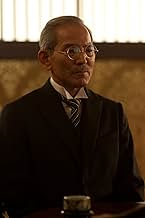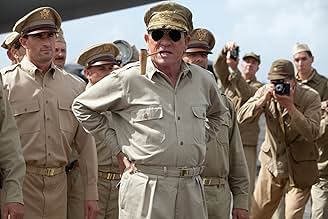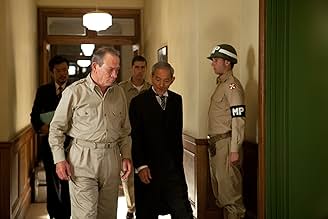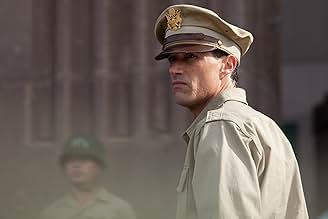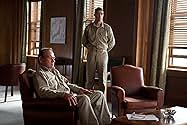AVALIAÇÃO DA IMDb
6,5/10
15 mil
SUA AVALIAÇÃO
Durante a ocupação do Japão após a Segunda Guerra Mundial, o comando das Forças Aliadas decide o destino do líder japonês e do próprio país.Durante a ocupação do Japão após a Segunda Guerra Mundial, o comando das Forças Aliadas decide o destino do líder japonês e do próprio país.Durante a ocupação do Japão após a Segunda Guerra Mundial, o comando das Forças Aliadas decide o destino do líder japonês e do próprio país.
- Direção
- Roteiristas
- Artistas
- Prêmios
- 1 indicação no total
- Direção
- Roteiristas
- Elenco e equipe completos
- Produção, bilheteria e muito mais no IMDbPro
Avaliações em destaque
Matthew Fox and Tommy Lee Jones play polarising American WW2 army generals to a tee in Emperor, the compellingly true story of the aftermath of the war in Japan, and the concerted US effort to compile enough evidence to convict Japanese Emperor Hirohito of war crimes. Trained on a seldom-acknowledged aspect of mankind's greatest battle, Emperor infuses a grand story with intimate relationships, making for a superb addition to the voluminous library of war on film.
While Tommy Lee Jones relishes in playing every Tommy Lee Jones character ever (stealing all the best lines in the process) as the hard-nosed but cunning General MacArthur, Fox delivers a more grounded and arresting performance as Bonner Fellers, a man torn between his moral obligations and his duty to the army, and to an American public crying out for blood.
Director Peter Webber infuses a romantic subplot with Fellers' Japanese girlfriend Aya (Eriko Hatsune) neatly, filling a role but never interjecting into a story that, quite frankly, is underscored by the power of men post-war. When MacArthur finally comes face-to-face with the Emperor after an excruciating build-up, the scene's emotional force and intense interplay perfectly resonate the best attributes of this vastly underrated drama.
*There's nothing I love more than a bit of feedback, good or bad. So drop me a line on jnatsis@iprimus.com.au and let me know what you thought of my review. If you're looking for a writer for your movie website or other publication, I'd also love to hear from you.*
While Tommy Lee Jones relishes in playing every Tommy Lee Jones character ever (stealing all the best lines in the process) as the hard-nosed but cunning General MacArthur, Fox delivers a more grounded and arresting performance as Bonner Fellers, a man torn between his moral obligations and his duty to the army, and to an American public crying out for blood.
Director Peter Webber infuses a romantic subplot with Fellers' Japanese girlfriend Aya (Eriko Hatsune) neatly, filling a role but never interjecting into a story that, quite frankly, is underscored by the power of men post-war. When MacArthur finally comes face-to-face with the Emperor after an excruciating build-up, the scene's emotional force and intense interplay perfectly resonate the best attributes of this vastly underrated drama.
*There's nothing I love more than a bit of feedback, good or bad. So drop me a line on jnatsis@iprimus.com.au and let me know what you thought of my review. If you're looking for a writer for your movie website or other publication, I'd also love to hear from you.*
"This country is starving and teetering on the edge of total collapse. It wouldn't take much for the resentment to ignite into revolt and the fate of the emperor could be just the spark." After the Japanese surrender ends WWII the US Government wants to know who was behind the bombing of Pearl Harbor. General Douglas MacArthur (Jones) charges General Bonner Fellers (Fox) with an important mission. Fellers is to decide if Emperor Hirohito should be charged as a war criminal and hung. To make matters even harder Fellers is also searching for his lost love in the midst of the war ravaged country. Being a history buff I was really looking forward to seeing this movie. This movie really shows the tense decision Fellers was charged with, his conclusion really will decide the fate of an entire country as well as relations between the US and Japan. The movie shows the lengths people will go to protect someone they revere as a God and how close the country came to a completely different future. I really enjoyed this being a history buff but I do have to say for people that aren't as interested in this stuff you may find it a little slow. Overall, a very tense look at one of the most important days of post war Japan. I give it a B+.
Emperor (2012)
In his rule over Japan as Supreme Commander of the occupying forces after World War II, General Douglas MacArthur was probably as benign a dictator as history has recorded. His enlightened policies led to a Japanese post war economic recovery from wartime devastation, and to post-war harmony between Japan and the West that replaced virulent wartime hatred. Emperor deals with his first days in Japan after the Japanese surrender, and in particular, with his momentous decision not to include the Emperor Hirohito among the Japanese war criminals, a judgement made despite political and popular clamor. Allied war propaganda had demonized the Japanese people and Hirohito in particular, and Japanese propaganda had done much the same with the other side. MacArthur's decision became the lynch-pin of his policy there: to respect the cultural differences instead of seeking to override them, and to try to bring together the best that both Japan and the western powers had to offer.
The movie deliberately avoids clarifying which emperor the title refers to. On the surface it may seem to denote Hirohito, but as supreme commander MacArthur had near imperial power, and did not hesitate to use it. The film concentrates on one of his protégés and close advisors, General Bonner Fellers, a Japanese expert on whose opinion MacArthur chooses to rely. Fellers was close to MacArthur, having served with him even before the war. Fellers loved Japan and had visited it, and had produced for the American military a crucial assessment of the Japanese military mind. He had additionally predicted war with Japan well in advance of Pearl Harbour. In real life, Fellers had some connections to Japan, even to the Imperial Household, and he had a close friendship with a former female Japanese exchange student whom he knew from Earlham College in Indiana. He rejoined MacArthur in 1943 and accompanied him during the Supreme Commander's momentous first days in Japan. The film strongly hints that MacArthur had already made up his mind about the treatment of Hirohito, which he almost certainly had, but wanted Fellers to supply the rationale for his decision.
The film has three threads that run throughout: MacArthur's occupation of Japan; Fellers' investigations leading to his written opinion; Fellers' search for his Japanese friend amidst the post-war chaos. It is one thread too many, since while the film juxtaposes these, it does not successfully weave them together. The one exception may be Fellers interview with the Japanese general, supposedly his friend's uncle, since it does much to explain the country's traditions and military attitudes. Director Peter Webber has said quite rightly that MacArthur has not been particularly successfully treated on the screen. In fact, epics like MacArthur (1977) and Inchon (1981) proved to be major disappointments. It seems a shame here that the director and writers Vera Blasi and David Klass did not keep MacArthur as the film's central figure, but instead chose to focus on his subordinate, Fellers.
As MacArthur, Tommy Lee Jones gives an outstanding performance, and the film is worth seeing for that alone. Looking nothing like MacArthur (he didn't try), Jones captures ever bit of "El Supremo's" command and self-confidence, and when he is present on screen, like the General himself, he dominates it. It is just a shame that he doesn't get more screen time. MacArthur is, historically, the man who made the real decisions, and, especially as played by Jones, a figure far more fascinating than Fellers.
By contrast, the part of Fellers (Matthew Fox of "Lost") seems dull, unfocused, and even clumsy, particularly considering the crucial days in which it is set. That is probably not Fox's fault, but a weakness of the screenplay. While the fact that Fellers knew Japan well and was especially friendly with a Japanese girl he had met in college are factors that deserve to enter into the picture, as presented they often tend to be a distraction from its central theme. This is all the more the case since the story of "Aya" appears to contain considerable fiction. Feller's real-life friend from Earlham, Yuri Wantanabe, survived the war, and his connections to Japanese officialdom were probably better than her own. There is the additional fiction that all this is compressed into a ten-day window, when the actual investigations took place over five months.
Still, in playing Aya, Eriko Hatsune renders her subtly, displaying a delicate balance between propriety and concern. Some of the other Japanese actors are equally notable. Especially fine, and especially central to the story, is the portrayal by Masatô Ibu of the Lord Privy Seal, Marquis Koichi Kibo, the highest figure in the Imperial Household and a friend to Hirohito. Ibu is persuasive in presenting a man who attempts to preserve the Emperor's honour – and his privacy – even in the face of the possibility that the Emperor might hang. Masayoshi Haneda also gives a fine performance as Fellers' interpreter and de facto aide. And Takatarô Kataoka is realistic as Emperor Hirohito himself.
The wanderings of the plot are offset in part by the great production values (Grant Major)and fine cinematography (by Stuart Dryburgh). The contrast between the real beauty of Japan and the wartime devastation is particularly effective.
This movie has many good things going for it, particularly Tommy Lee Jones (and MacArthur himself). It's just a pity it didn't capitalize on them more.
Emperor premiered at the Toronto International Film Festival on September 14, 2012. It has been acquired for distribution by Lionsgate & Roadside Attractions, but no date for general distribution has yet been announced.
In his rule over Japan as Supreme Commander of the occupying forces after World War II, General Douglas MacArthur was probably as benign a dictator as history has recorded. His enlightened policies led to a Japanese post war economic recovery from wartime devastation, and to post-war harmony between Japan and the West that replaced virulent wartime hatred. Emperor deals with his first days in Japan after the Japanese surrender, and in particular, with his momentous decision not to include the Emperor Hirohito among the Japanese war criminals, a judgement made despite political and popular clamor. Allied war propaganda had demonized the Japanese people and Hirohito in particular, and Japanese propaganda had done much the same with the other side. MacArthur's decision became the lynch-pin of his policy there: to respect the cultural differences instead of seeking to override them, and to try to bring together the best that both Japan and the western powers had to offer.
The movie deliberately avoids clarifying which emperor the title refers to. On the surface it may seem to denote Hirohito, but as supreme commander MacArthur had near imperial power, and did not hesitate to use it. The film concentrates on one of his protégés and close advisors, General Bonner Fellers, a Japanese expert on whose opinion MacArthur chooses to rely. Fellers was close to MacArthur, having served with him even before the war. Fellers loved Japan and had visited it, and had produced for the American military a crucial assessment of the Japanese military mind. He had additionally predicted war with Japan well in advance of Pearl Harbour. In real life, Fellers had some connections to Japan, even to the Imperial Household, and he had a close friendship with a former female Japanese exchange student whom he knew from Earlham College in Indiana. He rejoined MacArthur in 1943 and accompanied him during the Supreme Commander's momentous first days in Japan. The film strongly hints that MacArthur had already made up his mind about the treatment of Hirohito, which he almost certainly had, but wanted Fellers to supply the rationale for his decision.
The film has three threads that run throughout: MacArthur's occupation of Japan; Fellers' investigations leading to his written opinion; Fellers' search for his Japanese friend amidst the post-war chaos. It is one thread too many, since while the film juxtaposes these, it does not successfully weave them together. The one exception may be Fellers interview with the Japanese general, supposedly his friend's uncle, since it does much to explain the country's traditions and military attitudes. Director Peter Webber has said quite rightly that MacArthur has not been particularly successfully treated on the screen. In fact, epics like MacArthur (1977) and Inchon (1981) proved to be major disappointments. It seems a shame here that the director and writers Vera Blasi and David Klass did not keep MacArthur as the film's central figure, but instead chose to focus on his subordinate, Fellers.
As MacArthur, Tommy Lee Jones gives an outstanding performance, and the film is worth seeing for that alone. Looking nothing like MacArthur (he didn't try), Jones captures ever bit of "El Supremo's" command and self-confidence, and when he is present on screen, like the General himself, he dominates it. It is just a shame that he doesn't get more screen time. MacArthur is, historically, the man who made the real decisions, and, especially as played by Jones, a figure far more fascinating than Fellers.
By contrast, the part of Fellers (Matthew Fox of "Lost") seems dull, unfocused, and even clumsy, particularly considering the crucial days in which it is set. That is probably not Fox's fault, but a weakness of the screenplay. While the fact that Fellers knew Japan well and was especially friendly with a Japanese girl he had met in college are factors that deserve to enter into the picture, as presented they often tend to be a distraction from its central theme. This is all the more the case since the story of "Aya" appears to contain considerable fiction. Feller's real-life friend from Earlham, Yuri Wantanabe, survived the war, and his connections to Japanese officialdom were probably better than her own. There is the additional fiction that all this is compressed into a ten-day window, when the actual investigations took place over five months.
Still, in playing Aya, Eriko Hatsune renders her subtly, displaying a delicate balance between propriety and concern. Some of the other Japanese actors are equally notable. Especially fine, and especially central to the story, is the portrayal by Masatô Ibu of the Lord Privy Seal, Marquis Koichi Kibo, the highest figure in the Imperial Household and a friend to Hirohito. Ibu is persuasive in presenting a man who attempts to preserve the Emperor's honour – and his privacy – even in the face of the possibility that the Emperor might hang. Masayoshi Haneda also gives a fine performance as Fellers' interpreter and de facto aide. And Takatarô Kataoka is realistic as Emperor Hirohito himself.
The wanderings of the plot are offset in part by the great production values (Grant Major)and fine cinematography (by Stuart Dryburgh). The contrast between the real beauty of Japan and the wartime devastation is particularly effective.
This movie has many good things going for it, particularly Tommy Lee Jones (and MacArthur himself). It's just a pity it didn't capitalize on them more.
Emperor premiered at the Toronto International Film Festival on September 14, 2012. It has been acquired for distribution by Lionsgate & Roadside Attractions, but no date for general distribution has yet been announced.
I thought I might be the only one who found this film interesting since I spent 7 years in Japan and happened to be there when Emperor Hirohito died. At that time, there was a renewed discussion of how much he was responsible for beginning World War II. In the end, it seemed he was more or less strong-armed into the war by right wing politicians. True, he could be blamed for being weak-willed, but he did not have the mental constitution to be an emperor in the first place. If he could have chosen, he would have been a marine biologist, as marine biology was his hobby and passion. There was no more confusing and cathartic time in Japanese history than when MacArthur and the American military came in to occupy Japan. The entire society had to re-evaluate itself on all levels. How could they, the greatest people in the world, be conquered by such an uncultured civilization? This question persists until the present day.
It was not clear at the beginning of this film whether it was a true story or a story based around true events. If the fact that it was a true story had been made clearer, it would have been more compelling. Nonetheless, it did capture most of the turbulent elements of that time. The love affair, that parallels this story is a good one and one that exposes the prejudice that existed against any Japanese woman who dared marry outside her culture. Eriko Hatsune was perfect in the role of an intelligent woman caught between tradition and emotion. Unfortunately, Matthew Foxx (General Bonner Fellers) acted as if he had been hit by a tranquilizer dart. Tommy Lee Jones overacted the role of MacArthur and was equally unconvincing.
Be warned. This is not an action movie,though a few action scenes exist. This is mainly a movie based on philosophic discussions, psychology, and cultural misunderstandings. Still, it offers a good view of an important time in world history.
It was not clear at the beginning of this film whether it was a true story or a story based around true events. If the fact that it was a true story had been made clearer, it would have been more compelling. Nonetheless, it did capture most of the turbulent elements of that time. The love affair, that parallels this story is a good one and one that exposes the prejudice that existed against any Japanese woman who dared marry outside her culture. Eriko Hatsune was perfect in the role of an intelligent woman caught between tradition and emotion. Unfortunately, Matthew Foxx (General Bonner Fellers) acted as if he had been hit by a tranquilizer dart. Tommy Lee Jones overacted the role of MacArthur and was equally unconvincing.
Be warned. This is not an action movie,though a few action scenes exist. This is mainly a movie based on philosophic discussions, psychology, and cultural misunderstandings. Still, it offers a good view of an important time in world history.
In the fine biographical movie MacArthur which starred Gregory Peck as the controversial general only a small part was devoted to the years as Supreme Commander Allied Powers in charge of the occupation of Japan. Even liberal historians give Douglas MacArthur credit for the vast and peaceful societal change that our occupation of Japan post World War II wrought. We haven't been that successful since. And only a part of that part of the movie concerned the decision about the Emperor's fate.
Emperor concerns those fateful first days of the occupation when MacArthur made the decision not to try the Emperor or members of the royal family as war criminals. Doing the investigation on MacArthur's behalf was General Bonner Fellers who was an army intelligence officer with a background in Japanese language and culture. Matthew Fox is General Fellers and he's got another mission for himself, to find an exchange student from Japan from his youth and whom he knew up to the declaration of war between the USA and Japan.
Tommy Lee Jones plays MacArthur and while he doesn't have that majestic cultured voice that MacArthur had, he still creates a good impression of the imperious general who had a dislike of civil authority. In fact traces of the behavior that got him sacked by Harry Truman during the Korean War are shown. In this case though MacArthur with help of Fellers and his own knowledge of the Asian scene had the right instincts.
The Emperor of Japan centuries ago was a true ruler and over the centuries evolved into a constitutional monarch. But not the same as that Windsor family that reigns in the United Kingdom. The Japanese Shinto religion conferred divine status, the original emperor one Jimmu Tenno is supposed to be descended from the sun god. Japan's wars and foreign policy were done in his name, still are to some extent. A greater decision from Hirohito's part came when he said that he and his family were not divine.
Not covered in this film was the fact that Hirohito had some brothers, at least one of them would have been a more than willing tool of the army and navy chiefs who conducted Japan's war. He faced until the surrender the distinct possibility of being overthrown himself by one of his siblings.
Matthew Fox and Tommy Lee Jones and the Japanese cast are perfectly cast in their roles and I recommend this film as good entertainment and for those with an interest in the Far East.
Emperor concerns those fateful first days of the occupation when MacArthur made the decision not to try the Emperor or members of the royal family as war criminals. Doing the investigation on MacArthur's behalf was General Bonner Fellers who was an army intelligence officer with a background in Japanese language and culture. Matthew Fox is General Fellers and he's got another mission for himself, to find an exchange student from Japan from his youth and whom he knew up to the declaration of war between the USA and Japan.
Tommy Lee Jones plays MacArthur and while he doesn't have that majestic cultured voice that MacArthur had, he still creates a good impression of the imperious general who had a dislike of civil authority. In fact traces of the behavior that got him sacked by Harry Truman during the Korean War are shown. In this case though MacArthur with help of Fellers and his own knowledge of the Asian scene had the right instincts.
The Emperor of Japan centuries ago was a true ruler and over the centuries evolved into a constitutional monarch. But not the same as that Windsor family that reigns in the United Kingdom. The Japanese Shinto religion conferred divine status, the original emperor one Jimmu Tenno is supposed to be descended from the sun god. Japan's wars and foreign policy were done in his name, still are to some extent. A greater decision from Hirohito's part came when he said that he and his family were not divine.
Not covered in this film was the fact that Hirohito had some brothers, at least one of them would have been a more than willing tool of the army and navy chiefs who conducted Japan's war. He faced until the surrender the distinct possibility of being overthrown himself by one of his siblings.
Matthew Fox and Tommy Lee Jones and the Japanese cast are perfectly cast in their roles and I recommend this film as good entertainment and for those with an interest in the Far East.
Você sabia?
- CuriosidadesThe romantic story between Fellers and Aya was entirely fictional for the film. Bonner F. Fellers was married in 1925 to Dorothy Dysart who accompanied him twice on his posting to the Phillipines, and she also went with him to China and Japan.
- Erros de gravaçãoIn the opening sequence the film makers use archival film showing an atom bomb being loaded into the bomb bay a B-29 for the attack on Hiroshima. The bomb shown is "Fat Man" and not "Little Boy" that was used on the attack on Hiroshima (8-6-1945). "Fat Man" was used in the second attack, three days later (8-9-1945) on Nagasaki.
- Citações
General Douglas MacArthur: I don't want the Communists in here. But Washington wants vengance on the emperor, because their voters do, and their voters have no fucking idea what's good for them.
Principais escolhas
Faça login para avaliar e ver a lista de recomendações personalizadas
- How long is Emperor?Fornecido pela Alexa
Detalhes
- Data de lançamento
- Países de origem
- Centrais de atendimento oficiais
- Idiomas
- Também conhecido como
- Emperor
- Locações de filme
- Empresas de produção
- Consulte mais créditos da empresa na IMDbPro
Bilheteria
- Faturamento bruto nos EUA e Canadá
- US$ 3.346.265
- Fim de semana de estreia nos EUA e Canadá
- US$ 1.014.099
- 10 de mar. de 2013
- Faturamento bruto mundial
- US$ 14.858.240
- Tempo de duração
- 1 h 47 min(107 min)
- Cor
- Mixagem de som
- Proporção
- 2.35 : 1
Contribua para esta página
Sugerir uma alteração ou adicionar conteúdo ausente








